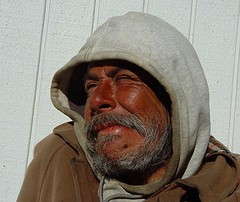 It was not all that long ago that we wrote about a census of the homeless being undertaken in downtown San Diego, a census that just might inspire a similar effort in the city’s Uptown area. Today, we would like to revisit that topic by calling your attention to a wonderful piece written by Kelly Davis in the San Diego City Beat.
It was not all that long ago that we wrote about a census of the homeless being undertaken in downtown San Diego, a census that just might inspire a similar effort in the city’s Uptown area. Today, we would like to revisit that topic by calling your attention to a wonderful piece written by Kelly Davis in the San Diego City Beat.
It’s an excellent read that provides Davis’ both a firsthand account of participating in the survey and a thumbnail breakdown of the similar social justice initiatives over the recent years. The combination of history and narrative makes a great introduction to the issue as expressed in the San Diego’s culture. Unlike many efforts of this nature, Davis’ is not blindingly negative about everything — she points out little known but important successes. She writes:
It’s not like San Diego doesn’t know how to be innovative. In the late ’90s, three programs started here that are held up as models nationwide: homeless court, designed to deal with the unique problems of homelessness in the criminal justice system; Stand Down, the annual weekend-long event that provides shelter and services to homeless vets; and the San Diego Police Department’s Serial Inebriate Program, which offers the option of treatment rather than jail time to homeless chronic alcoholics. But when it comes to providing housing and shelter, San Diego has lagged.
While the survey that Common Ground helped organize here — and in roughly three-dozen other cities — has a goal of breaking down the problem into manageable sets of data (finding out, for instance, the number of homeless seniors who might qualify for housing vouchers), it’s also an attempt to put names, faces and stories to homelessness.
And that is really the key, is it not? To re-humanize the people who have been objectified and forgotten by society as a whole. Of course, that is only one aspect of the effort being undertaken both by that group, and the others.
Davis’ recounting of an encounter with a homeless woman known only as “Sonya” points out one large gap that even this approach has yet to close. Obviously mentally ill, Sonya had trouble answering even the most rudimentary questions and has declined to take part in the survey. Becky Kanis, director of innovations for the New York-based housing and social-services provider Common Ground, who was in San Diego for the survey, states that it is people like Sonya, who decline to participate in the census, are in jeopardy the most. We have yet to find a way to address that gap, but, as with all things, we must approach this one step at a time.
Source: “Action = good,” San Diego City Beat, 09/29/10
Image by Matt From London, used under its Creative Commons license.
Visit Us on Facebook: Humane Exposures Publishing , downTownUSA, Maggots in My Sweet Potatoes, It’s More Expensive To Do Nothing

 Early morning last Monday had seen faces that you wouldn’t normally see at that hour fan out through downtown San Diego, as the volunteers had attempted to take a census of the society’s disenfranchised. The effort is part of a national initiative to get better data about the homeless population so that help can be given to those most in need. The goal is to reduce the number of homeless on the streets by 100,000 between now and the middle of 2013.
Early morning last Monday had seen faces that you wouldn’t normally see at that hour fan out through downtown San Diego, as the volunteers had attempted to take a census of the society’s disenfranchised. The effort is part of a national initiative to get better data about the homeless population so that help can be given to those most in need. The goal is to reduce the number of homeless on the streets by 100,000 between now and the middle of 2013.







